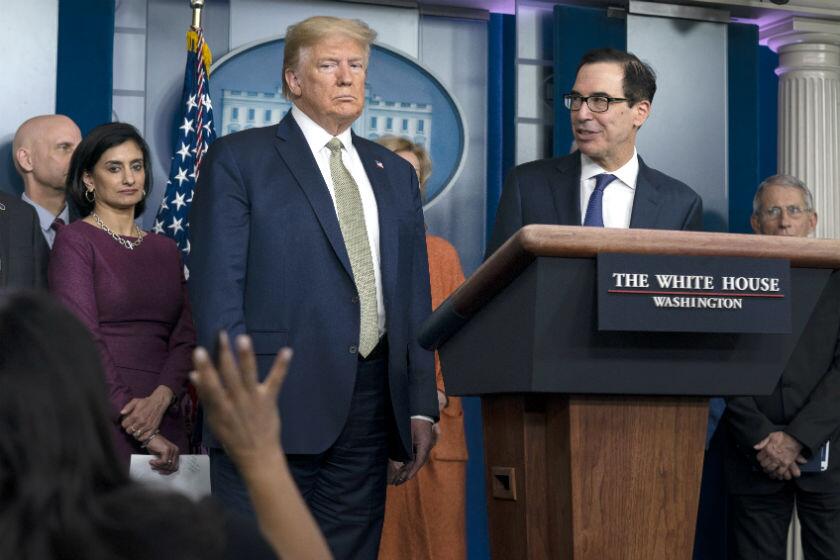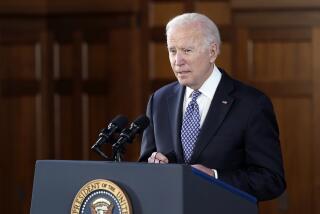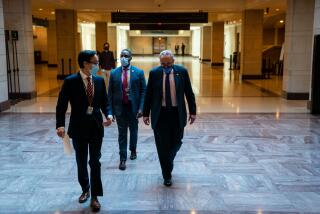White House seeks $1-trillion economic stimulus, including payouts to Americans

- Share via
WASHINGTON — The Trump administration on Tuesday proposed a $1-trillion economic stimulus package to counter the effects of the coronavirus, including relief for small businesses and the airline industry, and sizable checks for Americans in the next two weeks.
Treasury Secretary Steven T. Mnuchin outlined the request to Senate Republicans at a closed-door lunch on Capitol Hill and has been in discussions with House Democratic leaders.
“It’s going to be big and it’s going to be bold,” President Trump said, praising the bipartisan commitment in Congress to move quickly.
Senate Republicans — having taken a backseat to the administration and House Democrats on two prior coronavirus response bills — indicated that they will take the lead on writing the latest stimulus measure, which is expected to track the administration’s $1-trillion request.
Senate Majority Leader Mitch McConnell (R-Ky.) said the Senate would remain in session until it enacts the measure.
“We are crafting the major legislation that the American people deserve in the face of this major challenge,” McConnell said. “And it is my intention that the Senate will not adjourn until we have passed significant and bold new steps, above and beyond what the House passed, to help our strong nation and our strong underlying economy weather this storm.”
The president announced Wednesday that he had ordered federal housing officials to suspend evictions and foreclosures until the end of April.
Lawmakers on Capitol Hill expressed widespread support for a significant and immediate economic stimulus package — one that will likely top the response to the 2008 financial crisis. During that time, lawmakers quickly approved hundreds of billions of dollars to soften what would become the Great Recession.
The fast-moving coronavirus legislation reflects the urgent need to flush cash into a society that is rapidly changing as workers stay home, airlines cancel flights and restaurants and institutions close their doors to try to contain the spread of the virus. Mnuchin described much of the assistance as “business interruption” funding.
A key component is expected to be checks sent to Americans in the coming weeks. Mnuchin, who has become the administration’s frontman in negotiating the stimulus, said details would be announced shortly about how large the checks would be and when they would be sent. He suggested the amounts would be larger than the $1,000 checks proposed in recent days.
McConnell did not commit to including per-person checks in his package but did say there would be some component to put money directly into the hands of individuals. Rank-and-file Senate Republicans support the idea of quickly infusing society with cash and helping workers who face layoffs.
“I think really now it’s just a question of drafting it and crafting it in a way that can pass and work — that will work soon enough,” said Sen. Marco Rubio (R-Fla.), a sentiment that was echoed almost universally among Senate Republicans.
The latest updates from our reporters in California and around the world
Rubio, like Mnuchin, defended the billions of dollars that will be added to the nation’s deficit in the coming weeks.
“We’re not talking about businesses here that made bad decisions that are asking to be bailed out. This is a virus,” he said. “That is an extraordinary development.”
The plan is generally expected to also include payments and loans to small businesses to keep their payrolls afloat, and loan guarantees to industries such as airlines and hotels. Trump said airline maker Boeing is expected to be included as well.
“This is worse than 9/11” for the airline industry, Mnuchin said, saying the sector has “almost ground to a halt.”
Several Republicans said the size of the checks should rise based on one’s income and family size, although the more targeted the support, the longer it may take to arrive in Americans’ mailboxes.
There is precedent for the federal government to send checks straight to Americans, including in 2001 and during the Great Recession. In 2008, the Bush administration’s tax-rebate program sent checks of up to $600 to individual taxpayers and $1,200 to married couples.
Such direct payments are usually spent almost immediately, especially by people with little savings, according to research. But it’s unclear whether that will occur this time because consumers have been told not to travel or go to malls, restaurants and theaters to protect public health.
As it focuses on the new measure, the Senate is also expected to approve a bill the House passed early Saturday that would enact paid sick leave for a significant chunk of the U.S. workforce. That bill, hung up for several days over last-minute changes, also pays for coronavirus testing and provides expanded food aid and unemployment assistance for people who lose work because of the pandemic.
Many Senate Republicans didn’t like the plan but agreed to support it in order to move onto the third, much more substantial economic measure.
“My counsel to them is gag and vote for it anyway,” McConnell said.
The Federal Reserve, which Sunday slashed interest rates to near zero, announced Tuesday that it would use its emergency lending powers to help extend credit to support households and businesses.
The Fed program, similar to the one it created during the financial crisis more than a decade ago, would allow the central bank to buy so-called commercial paper, a market that the Fed said is important in providing “credit and funding for auto loans and mortgages as well as liquidity to meet the operational needs of a range of companies.” The U.S. Treasury authorized a $10-billion backstop to fund this lending facility.
After initially hesitating, most global leaders have decided they have no choice but to take the economic pain. In both directions, the costs are enormous.
The administration also encouraged taxpayers to file their taxes by April 15 if they are getting a refund in order to add cash to the marketplace. But Mnuchin said if individuals or businesses owe taxes, they can get a deferment with no interest for 90 days. Individuals could defer up to $1 million in taxes owed and corporations could defer up to $10 million.
Trump, White House officials and congressional leaders held several meetings Monday and Tuesday with industries expected to get assistance from the plan. Trump met Tuesday with executives from the restaurant industry. And the House Transportation Committee chairman, Rep. Peter A. DeFazio (D-Ore.) is slated to hold a phone meeting with airline industry chief executives.
But it’s far from certain Democrats will be eager to help the companies.
Rep. Katie Porter (D-Irvine), a former consumer advocate who worked with families during the financial crisis, cautioned against passing substantial help for corporations in a fast-moving piece of legislation. She said there were pieces of legislation passed “late at night” during the foreclosure crisis that had “a decade of consequences to American families.”
“There are some things we need to be doing immediately,” she said in an interview, pointing to school lunch funding and meals for seniors. “Cries from big corporations that just gave out 96% or more of their profits in stock buybacks are not an urgent thing for today.”
Gov. Gavin Newsom says California is too large and its counties are too distinct for a one-size-fits-all approach to the coronavirus.
Sen. Elizabeth Warren (D-Mass.) dubbed such assistance a “bailout” and said companies that receive help must agree to a series of demands, including keeping working people on their payroll, provide a $15 minimum wage after the crisis and permanently end share repurchases.
Meanwhile, Senate Democrats are preparing a $750-billion package of their own. McConnell indicated that Senate Republicans would write the bill with the administration and then seek input from Democrats.
Minority Leader Charles E. Schumer (D-N.Y.) outlined the details of the plan during a Senate Democratic meeting conducted via teleconference to avoid a large gathering of senators.
“The resulting economic downturn from this virus is already impacting millions of American families, workers and business — small, medium and large alike,” Schumer said on the floor.
Individual Senate Republicans have released a series of proposals as well. Sen. Mitt Romney (R-Utah) has proposed a one-time $1,000 check for every American adult. Other Republicans have suggested similar proposals or a significant cut in payroll taxes.
Trump has set aside his push for a payroll tax cut for now, saying he wants to get cash to Americans faster.
Times staff writers Noah Bierman, Don Lee and Chris Megerian contributed to this report.
More to Read
Get the L.A. Times Politics newsletter
Deeply reported insights into legislation, politics and policy from Sacramento, Washington and beyond. In your inbox three times per week.
You may occasionally receive promotional content from the Los Angeles Times.













